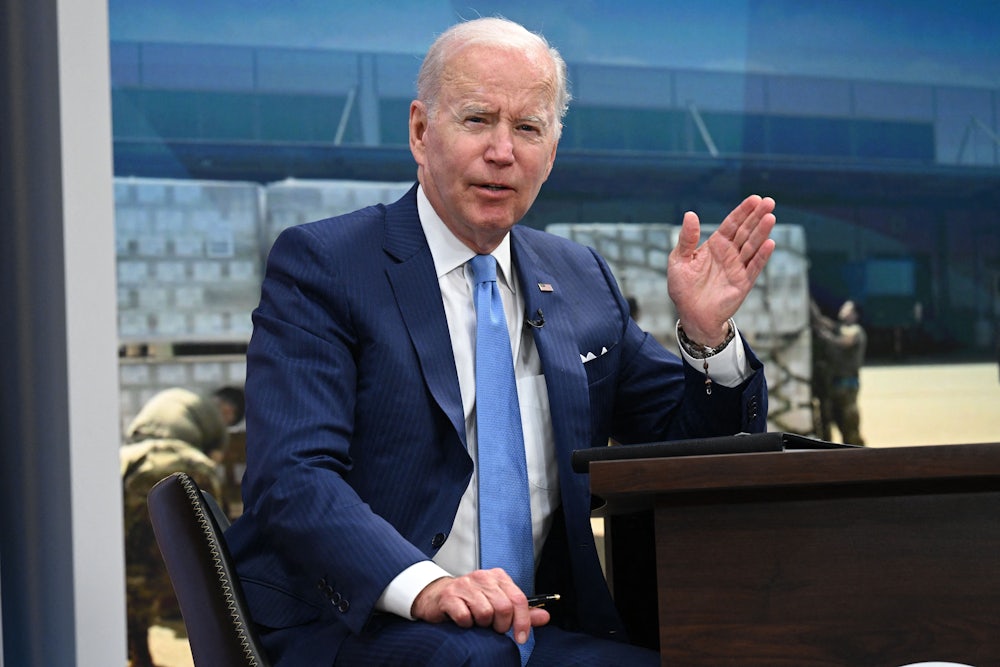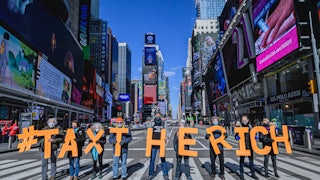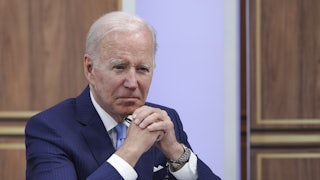The news industry craves narrative, and when none is available it constructs one with the incomplete ingredients at hand, like a chef who makes a soufflé without eggs. It can be done, and done in such a way as to leave the facts unviolated. But don’t ask me to stomach it.
The narrative of the moment is economic recession, and the eggless soufflé is a pair of stories in The Washington Post about how it’s going, even though it hasn’t started yet (and may not for a long time). The expectation that a recession is coming puts pressure on the Post and other news organizations to cover it now. The two Post stories don’t actually say the recession has arrived, because that wouldn’t be factual. But they behave as though it has, and that does an injustice to President Biden’s economic record.
Exhibit A is a Page 1 feature by Kyle Swenson in Wednesday’s Post about the boom in plasma donations. This is in most ways an excellent story, but it strains for topicality by suggesting this is a trend story related to Biden’s stewardship of the economy. Which it isn’t, especially.
Swenson reports that Christina Seal, a 41-year-old schoolteacher in Slidell, Louisiana, is struggling to make ends meet because inflation has played havoc with her household budget. Seal can only just make it on $54,000 a year. (That’s about $13,000 less than the national median household income.) But inflation has kicked up Seal’s weekly grocery bills by one-third; her utility bills have doubled; and the cost of filling her gas tank has risen from $40 to $70. Now Seal is so strapped that she’s selling her blood plasma twice a week, at serious cost to her health.
“Seal [is] not alone,” Swenson writes, and that seems likely enough. Lots of lower-income people live very close to the edge financially, and it doesn’t take much to put them underwater. Given that inflation is outrunning wages by 2.6 percent, it’s not surprising that last fall and winter, Seal tells Swenson, more people showed up at her local plasma center—she states this less directly than I do here, but I accept Swenson’s implication that that’s what she means. That’s on Biden (to whatever extent presidents are responsible for how the economy performs on their watch).
The Post does not, however, address whether more people are showing up at plasma centers nationally—the question that landed this story on Page 1. Swenson documents a shocking boom in what is euphemistically called plasma “donation,” but that boom turns out to be not a two-year trend but a two-decade one. Plasma donation centers tripled in number between 2005, when there were about 300, and 2020, when there were more than 900. Donations (i.e., plasma sales) quadrupled during roughly the same period. “Two-thirds of the world’s plasma supply comes from the United States,” Swenson writes, “in part because the country allows companies to pay for plasma.” That such an industry can thrive in the United States probably has a lot to do with sluggish wage growth since the bursting of the dot-com bubble in early 2000. Swenson offers no evidence that it has anything to do with the inflation surge that began a year ago or anything else that’s happening in the economy right now.
Exhibit B is a Post column published the same day by Heather Long. The U.S., she writes, “appears to be returning to a have/have not economy.” What she means is that the bottom 20 percent in the income distribution has spent its stimulus checks, retail sales are down at Walmart, and lower-income people are, as Swenson’s story demonstrated, getting socked by inflation, even as more affluent people are spending briskly and piling up savings.
But it’s awfully strange for Long to suggest we’re “returning” to a have/have not economy. Returning? Income inequality has been growing for more than 40 years.
Yes, wealthier people are spending a lot right now and saving a lot, while lower-income people are spending less and saving nothing. But if Long is describing the short-term picture—and her lead paragraph, which reviews the various reasons we may be on the brink of recession, makes clear that she is—then that story is actually more complicated and contradictory. The “quits” rate, the Bureau of Labor Statistics reported Wednesday, is still a very high 2.9 percent. We’ll find out Friday what May’s unemployment rate was, but in April it was a very low 3.6 percent, and the (low-wage) leisure and hospitality sector was still creating the most new jobs and experiencing the steepest wage hikes—so steep that they exceed inflation.* Meanwhile, rich people have lately been losing a lot of money in the stock market. It’s very difficult to say whether economic inequality is growing or shrinking at this precise moment. It’s also not a very interesting question, because the bigger picture is that over the longer term, inequality has been growing quite a lot. If it isn’t growing at this nanosecond in history, rest assured that it will resume growing in the next nanosecond. Indeed, if we have a recession, income inequality, as I noted earlier this week, will likely increase at least twice as fast as it usually does. But that hasn’t happened yet.
This isn’t the first time Long demonstrated obtuseness about economic history. At Davos in 2019, she asked computer tycoon Michael Dell what he thought of a proposal by Representative Alexandria Ocasio-Cortez to raise the top marginal income tax rate to 70 percent, noting the current rate was 37 percent. “Name a country where that’s worked, ever,” Dell replied. Economist Erik Brynjolfsson (then at MIT, now at Stanford) then chimed in, “the United States,” prompting Long to state, dismissively and incorrectly, “Briefly, in the ’80s.” Brynjolfsson then corrected both Long and Dell, explaining that the U.S. for a very long time—from the New Deal until the 1980s, which is to say, during the period of our greatest sustained growth in gross domestic product and lowest levels of income inequality—had a top marginal rate of 70 percent or higher.
Brynjolfsson got a few details wrong but mostly in ways that showed he was more right than he knew. President Franklin Roosevelt raised the top marginal tax rate to 79 percent in 1936, to 81 percent in 1940, to 88 percent in 1942, and to 94 percent in 1944. It dropped back into the 80s during the postwar years, then rose to 91 percent in 1951 and remained at 91 or 92 percent through the Eisenhower years. The top marginal rate dropped to 70 percent in 1965, as part of a tax cut initiated by President John F. Kennedy, and remained at least that high until President Ronald Reagan dropped it to 69.13 percent in 1981, to 50 percent in 1982, and finally to 28 percent in 1988. It crept up to approximately its current level (37 percent) under Presidents George H.W. Bush (violating his “no new taxes” pledge) and Bill Clinton. Biden proposes raising it slightly to 39.6 percent.
To summarize: Through the boom years of the 1950s, the top marginal tax rate was above 90 percent, and during the boom years of the 1960s it was at least 70 percent. When Reagan ran reelection ads in 1984 boasting that, economically, it was “morning again in America,” the top rate was still an unimaginably high (by today’s standards) 50 percent.
This history is highly relevant to current arguments about tax policy, and it’s surprising that Dell didn’t know it. It’s astonishing that Long, one of the top economics writers at one of the top American newspapers, didn’t. The exchange was bizarre enough to draw attention in The Atlantic, on NPR, and (by New Republic editor Michael Tomasky) in the journal Democracy. It was noted even in that chronicle of the rich and famous Vanity Fair. But it was difficult for readers to find the gist in The Washington Post.
Long reported some of Dell’s comments in her Post dispatch from Davos. But she left out Dell’s ignorant “name a country” challenge and Brynjolfsson’s answer to it, thereby omitting any suggestion that Dell’s opinion was so poorly informed as to be worthless. Here’s the passage:
Millionaires and billionaires in Davos panned the idea of higher taxes, arguing that the private sector does a better job than the government of spending money wisely.
“No, I am not supportive of that, and I don’t think it would help the growth of the U.S. economy,” Dell responded when asked about his views of Ocasio-Cortez’s proposal for a 70 percent marginal income tax on earnings above $10 million.
Dell noted that he and his wife contribute most of their wealth to a foundation. “I feel much more comfortable with our ability as a private foundation to allocate those funds than I do giving them to the government.”
Others argued that their tax rate is already high and that raising tax rates could push people to move abroad or not invest.
For balance, Long quoted the inequality scholar Branko Milanovic of City University of New York saying, “Davos is always in favor of reducing inequality and poverty: locally, nationally and globally—but not if they have to pay for it.” But nowhere did Long report the salient fact that the top marginal rate used to be 70 or 90 percent.
All three of these examples—Swenson’s casting the plasma-selling boom as an inflation story, Long’s shoehorning a four-decade inequality expansion into a single economic cycle, and Long’s earlier failure to note that Ocasio-Cortez’s proposed 70 percent top marginal income tax rate was less radical than Eisenhower’s tax policy—demonstrate a reluctance to place an economic moment in the context of what preceded it. Yes, we may soon have a recession. Or, possibly, not. “As long as the rich and upper-middle class continue to spend,” Long wrote Wednesday, “there probably won’t be a recession. But that doesn’t mean the economy will feel good to many, if not most, Americans.”
That’s correct. But it hasn’t felt good to them for four decades. To suggest otherwise is to bake a soufflé without eggs.
* This article has been updated.








